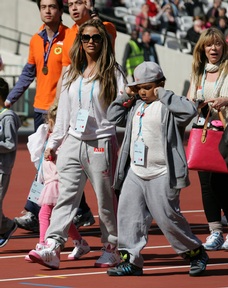MPs back Katie Price's call for law to stop 'horrendous' online abuse of disabled
MPs have found disabled people are subjected to an extreme level of abuse online and many have been driven from social media while their “abusers went unchecked”.

A report by the Petitions Committee found the ‘law on online abuse is not fit for purpose’.
The inquiry was triggered by a petition by celebrity Katie Price, whose disabled son Harvey is partially blind, autistic and has the genetic disorder Prader-Willi syndrome. She launched the petition in 2017, which attracted 221,914 signatures, due to the horrific abuse directed at her son Harvey.
Her petition called for online abuse to be made a criminal offence and for there to be a register of offenders.
In the petition, she said: “Trolling is a major problem in this day and age. People of all ages and background suffer every day, including my family - especially my son Harvey. I have tried my best to expose people and even had two arrested but nothing was done and there were no repercussions or penalties for this behaviour.
“This does not affect just high profile people it affects everyone from every walk of life from young children, teenagers, people at work, husbands and wives. This abuse includes racism, homophobia, body shaming and a whole range of other hate speech.
“This petition is an important topical issue and I want it to help bring justice to everyone who has ever suffered at the hands of trolls. Help me to hammer home worldwide that bullying is unacceptable whether it's face to face or in an online space.”
The Petition Committee's report Online abuse and the experience of disabled people calls on the government and social media companies to directly consult with disabled people on digital strategy and hate crime law.
It also says that disability hate crime is not fully recognised and perpetrators are not appropriately punished. The law on hate crime must give disabled people the same protections as those who suffer hate crime due to race or religion, adds the report.
Committee chair, Helen Jones MP, said: “Our inquiry into online abuse and the experience of disabled people has shown that social media is rife with horrendous, degrading and dehumanising comments about disabled people. The law on online abuse is not fit for purpose and it is truly shameful that disabled people have been forced off social media while their abusers face no consequences.
“There is no excuse for the continued failure to make online platforms as safe for disabled people. Self-regulation has failed disabled people and the law must change to ensure more lives are not destroyed.”
The committee heard oral evidence from disabled people who used social media, as well as representatives from Google, Facebook and Twitter, the police and disability campaigners.
The report also calls for the government to recognise that the way disabled people are often marginalised offline plays a significant part in the abuse they receive online.
MPs point out that the criminal justice system is too quick to categorise disabled people as ‘vulnerable’ and that hostility towards disabled people is often based on a perception that they are an easy target who can’t contribute to society.
They called for it to be possible to see if someone has been convicted of a hate crime on the grounds of disability before employing them to work closely with disabled people.
The committee found that when organisations were made aware of serious problems with abuse of disabled people, they were unwilling to act. As part of the inquiry, a high proportion of abusive content against disabled people, including Harvey Price, was related to football.
The report states: “It is deeply disappointing that the footballing organisations with whom we raised concerns about abusive behaviour expressed no interest in addressing the problem. Their lack of response is shameful.”
The Committee’s report, Online abuse and the experience of disabled people, is available here
Latest News
 29-Jul-24
Dementia Bus gives carehome.co.uk staff insight into life with dementia
29-Jul-24
Dementia Bus gives carehome.co.uk staff insight into life with dementia
 01-Mar-24
Find out the top care homes in 2024
01-Mar-24
Find out the top care homes in 2024
 21-Mar-23
UK's top care homes in 2023 revealed
21-Mar-23
UK's top care homes in 2023 revealed
 03-Jan-23
carehome.co.uk launches free care helpline
03-Jan-23
carehome.co.uk launches free care helpline
 13-Dec-22
5 mins with Emily Whitehurst, chief operating officer for Constantia Healthcare
13-Dec-22
5 mins with Emily Whitehurst, chief operating officer for Constantia Healthcare